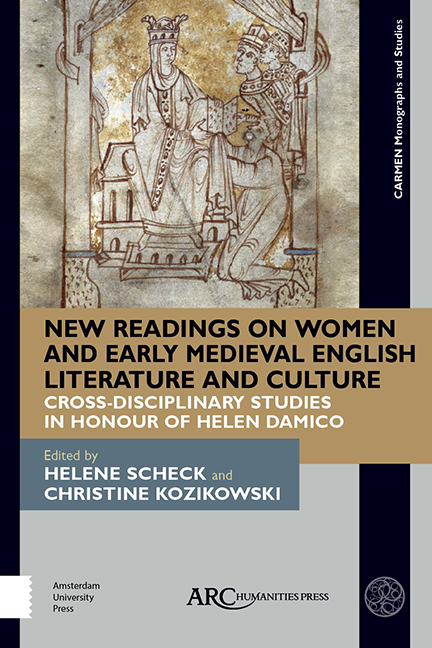 New Readings on Women and Early Medieval English Literature and Culture
New Readings on Women and Early Medieval English Literature and Culture Book contents
- Frontmatter
- Contents
- List of Illustrations
- List of Abbreviations
- Note from the Editors
- Introduction: Feminism and Early English Studies Now
- PART ONE LITERACY AND MATERIAL CULTURE
- PART TWO ENGENDERING MARRIAGE AND FAMILY
- PART THREE WOMEN OF THE BEOWULF MANUSCRIPT
- PART FOUR WOMEN AND ANGLO-SAXON STUDIES
- Select Bibliography
- Index of Manuscripts
- General Index
13 - Female Agency in Early Anglo-Saxon Studies: The “Nuns of Tavistock” and Elizabeth Elstob
Published online by Cambridge University Press: 20 November 2020
- Frontmatter
- Contents
- List of Illustrations
- List of Abbreviations
- Note from the Editors
- Introduction: Feminism and Early English Studies Now
- PART ONE LITERACY AND MATERIAL CULTURE
- PART TWO ENGENDERING MARRIAGE AND FAMILY
- PART THREE WOMEN OF THE BEOWULF MANUSCRIPT
- PART FOUR WOMEN AND ANGLO-SAXON STUDIES
- Select Bibliography
- Index of Manuscripts
- General Index
Summary
HELEN DAMICO, WHOSE career as scholar and teacher this volume honours, has made fundamental contributions to the study of Old English literature, especially through her work on Beowulf, embodied in her books “Beowulf” 's Wealhtheow and the Valkyrie Tradition and the recently published Beowulf and the Grendel-kin. Her dynamic pedagogy inspired students at the University of New Mexico from the time she took up her appointment there in 1981 until her retirement. She is a distinguished member of a line of female teachers of Old English who began to grace the universities of the Anglophone world from the 1930s; over the decades their number has included such luminaries as Dorothy Whitelock, Rosemary Woolf, Barbara Raw, Janet Bately, Christine Fell, Joyce Hill, Jane Roberts, Mary Clayton, Roberta Frank, and Katherine O’Brien O’Keeffe. Helen Damico has also shaped our knowledge of the history of the study of the Middle Ages through her leading editorial role on the three volumes published as Medieval Scholarship: Biographical Studies on the Formation of a Discipline, in which she sought to ensure that female scholars were appropriately represented. The present essay aims to celebrate her multiple accomplishments by considering the beginnings of female involvement in Anglo-Saxon studies. It investigates the grounds of a sixteenth-century belief that the study of Old English was cultivated by nuns in the late Middle Ages and explores lesser-known aspects of the work of the early eighteenth-century scholar Elizabeth Elstob, rightly reckoned a true foremother of Anglo-Saxon studies.
Old English at Tavistock?
Toward the end of the preface to his 1574 edition of Asser's Life of King Alfred, Matthew Parker (1504– 1575)— whose efforts to collect and scrutinize manuscripts did so much to launch the Early Modern trajectory of Anglo-Saxon studies— made an arresting claim that has caught the attention of subsequent scholars while also being strikingly misrepresented by them. After noting the utility of a familiarity with Old English for anyone who wishes to understand important ancient documents written in the vernacular, Parker continues:
To this end, in former centuries certain colleges of nuns were established by our forebears in which there would be women who would both be imbued with the knowledge of that language and, by communicating with others, would pass on that knowledge to posterity.
- Type
- Chapter
- Information
- New Readings on Women and Early Medieval English Literature and CultureCross-Disciplinary Studies in Honour of Helen Damico, pp. 229 - 260Publisher: Amsterdam University PressPrint publication year: 2019
- 1
- Cited by


